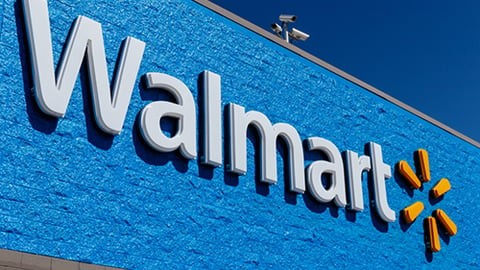Walmart Signs Shopify to Compete With Amazon Marketplace
Walmart U.S.'s e-commerce business grew more than 74% during the last quarter, and the Bentonville, Ark.-based company hopes that its latest move will catapult even greater growth. Walmart has teamed up with e-commerce platform Shopify to allow its sellers to use the Walmart Marketplace.
Ottawa, Ontario-based Shopify is used by more than 1 million businesses, and Walmart will start integrating new sellers now. The mega-retailer expects to add 1,200 Shopify sellers to its marketplace this year.
"We’re excited to be able offer customers an expanded assortment while also giving small businesses access to the surging traffic on Walmart.com," said Jeff Clementz, VP of Walmart Marketplace, in the announcement. "Shopify powers a dynamic portfolio of third-party sellers who are interested in growing their business through new, trusted channels. This integration will allow approved Shopify sellers to seamlessly list their items on Walmart.com, which gives Walmart customers access to a broader assortment."
Walmart said that its marketplace outpaced the overall e-commerce business growth during the last quarter, even as first-party sales were strong. For this reason, growing the marketplace with small and medium businesses, with assortments that complement what Walmart already sells, is a strategic priority.
One of the biggest e-commerce players in the marketplace space, of course, is Amazon, which is said to have 8.5 million total sellers and 2.1 million active sellers, according to intelligence firm Marketplace Pulse. Walmart has a long way to go to reach this number of sellers, if it even wants to, as Marketplace Pulse said that Walmart has approximately 45,000 sellers as of today. Walmart Marketplace requires approval to join as a seller.
Bentonville, Ark.-based Walmart operates more than 11,300 stores under 58 banners in 27 countries, and e-commerce websites, employing 2.2 million-plus associates worldwide. Walmart U.S. is No. 1 on The PG 100, Progressive Grocer's list of the top food retailers in North America, while Walmart-owned Sam's Club ranks No. 9 on the list. Seattle-based
Amazon is No. 2 on The PG 100, Progressive Grocer's 2020 list of the top food retailers in North America.





